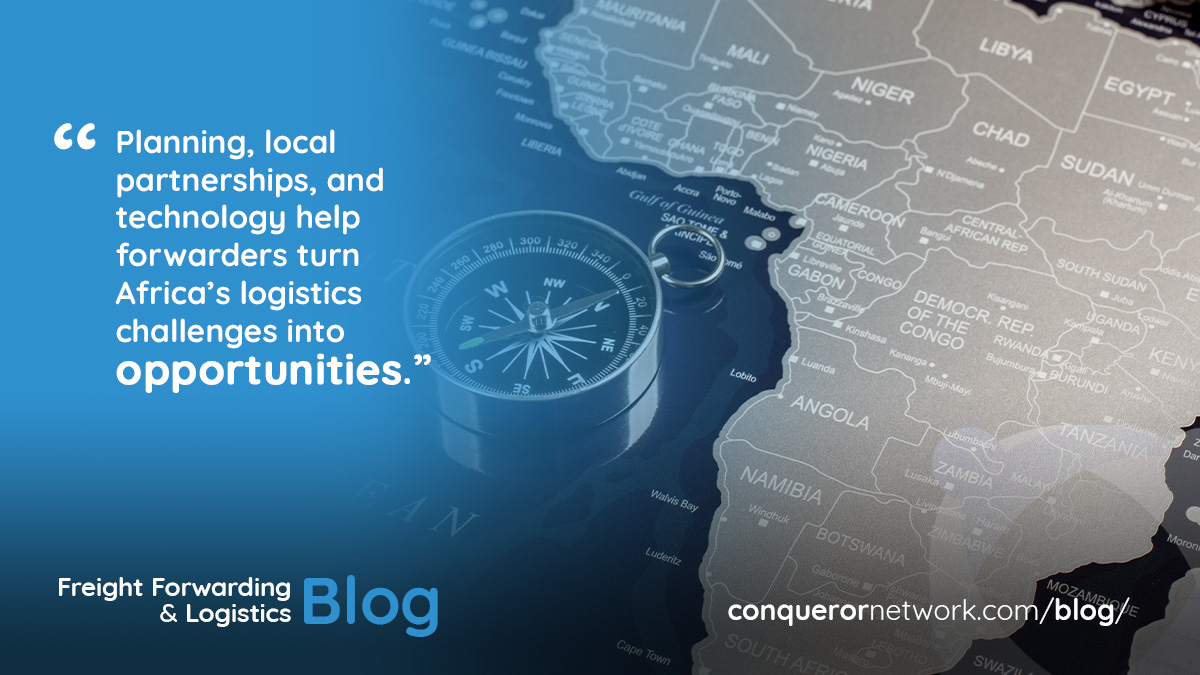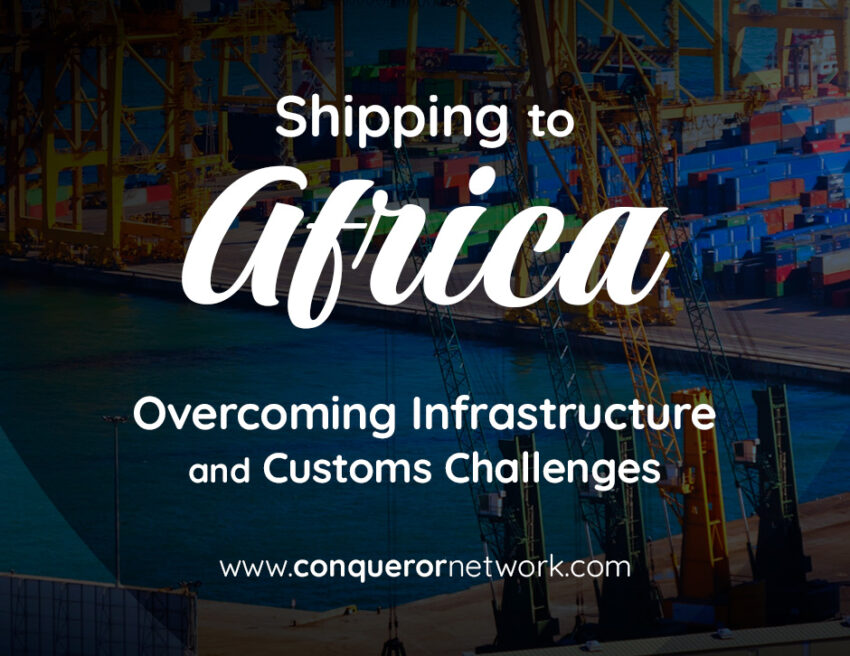Shipping to Africa offers tremendous growth opportunities for international trade, but it also presents unique challenges for freight forwarders in Africa. From outdated infrastructure to complex customs procedures, navigating these hurdles requires expertise, planning, and reliable partnerships. For forwarders seeking to expand into African markets, understanding these challenges and identifying solutions is crucial to ensuring smooth operations and satisfied clients.
This blog explores the current landscape of shipping to Africa, the pain points faced by freight forwarders, and opportunities to grow business while minimizing risk.

Infrastructure Challenges Across African Markets
One of the biggest obstacles for freight forwarders in Africa is the region’s varied and often underdeveloped infrastructure. While countries like South Africa, Kenya, and Morocco have relatively modern ports and road networks, many others struggle with congested ports, unreliable road transport, and limited rail connectivity.
-
Port congestion: Major ports like Lagos (Nigeria) or Durban (South Africa) often experience delays due to heavy traffic, lack of modern handling equipment, and bureaucratic inefficiencies.
-
Road transport limitations: Poorly maintained highways, long transit times, and security risks along key trucking routes can lead to delays and additional costs.
-
Rail and inland transport: Limited rail connectivity in several regions restricts efficient multimodal transport, forcing forwarders to rely heavily on road transport.
Freight forwarders must carefully plan routes, consider contingency options, and collaborate with reliable local partners to overcome these infrastructural bottlenecks.
Navigating Complex Customs and Regulatory Requirements
Customs procedures in Africa vary widely from country to country, creating additional challenges for freight forwarders. Each port may have its own documentation requirements, inspection protocols, and tariff structures. Delays often arise due to incomplete paperwork, misclassification of goods, or inconsistent application of regulations.
Key customs challenges include:
-
High import duties and tariffs: Many African countries maintain protective tariffs that can impact pricing and shipment planning.
-
Complex documentation: Forwarders must prepare accurate invoices, bills of lading, certificates of origin, and, in some cases, special permits for restricted goods.
-
Regulatory compliance: Some countries require pre-shipment inspections or compliance with local content rules, adding time and costs.
-
Corruption and bureaucracy: Navigating these risks often requires local knowledge and trusted agents on the ground.
Freight forwarders who invest in understanding regional regulations, building strong local relationships, and leveraging digital compliance tools can significantly reduce delays and avoid penalties.
Security and Operational Risks
In addition to infrastructure and customs hurdles, freight forwarders in Africa face security risks that can affect operations:
-
Cargo theft and hijacking: Certain regions experience higher risks along key trucking routes. Forwarders must implement security measures, including GPS tracking, secure warehousing, and vetted local partners.
-
Political instability: Sudden changes in government policies or civil unrest can disrupt ports, roads, or air transport, affecting delivery timelines.
-
Natural and environmental factors: Seasonal rains or flooding can temporarily close roads, and extreme heat can impact cargo handling and storage conditions.
These risks require freight forwarders to plan carefully, maintain flexible schedules, and have contingency strategies for their shipments.
Opportunities for Freight Forwarders in Africa
Despite these challenges, Africa represents a growing market for international trade and freight forwarding services. Opportunities include:
-
Emerging markets: Rapid urbanization, expanding industrial hubs, and increasing demand for consumer goods create new shipping opportunities.
-
Project cargo and specialized shipments: Forwarders who handle oversized or sensitive cargo can position themselves as experts and charge premium rates.
-
Partnerships with local agents: Collaborating with trusted local partners allows forwarders to navigate regulations and infrastructure constraints more effectively.
-
Technology adoption: Digital platforms for shipment tracking, customs documentation, and route optimization help forwarders improve efficiency and reduce errors.
Forwarders who combine local knowledge, technology, and strategic planning can build a competitive advantage in the African logistics market.
Leveraging Networks for Growth
For freight forwarders in Africa, joining a global logistics network such as Conqueror Freight Network can amplify their growth potential. Being part of a network provides:
-
Access to a trusted pool of international partners for cross-border shipments.
-
Shared best practices and insights on navigating African infrastructure and customs challenges.
-
Increased visibility and credibility among clients and other members worldwide.
-
Opportunities to participate in collaborative projects that expand business reach.
Membership in a global network enables forwarders to operate more confidently, manage risk, and take advantage of new market opportunities with the support of experienced peers.
Strategies to Overcome Challenges
Freight forwarders can adopt several strategies to manage the challenges of shipping to Africa:
-
Pre-shipment planning: Anticipate customs requirements, potential delays, and security risks.
-
Local partnerships: Work with trusted local agents for warehousing, clearance, and last-mile delivery.
-
Technology integration: Utilize shipment tracking, automated documentation, and predictive analytics to streamline operations.
-
Risk management: Incorporate insurance, route alternatives, and security measures for high-value or sensitive cargo.
-
Training and expertise: Invest in staff knowledge on regional regulations, tariff structures, and project cargo handling.
Forwarders who implement these practices can not only overcome challenges but also capitalize on Africa’s growing trade potential.
Conclusion
Shipping to Africa is not without its hurdles. Infrastructure limitations, complex customs procedures, and security risks pose significant challenges for freight forwarders in Africa. However, with careful planning, local partnerships, and the use of technology, these challenges can be managed effectively.
Africa’s expanding markets and growing trade volumes offer substantial opportunities for forwarders who are prepared to navigate this environment. Membership in networks like Conqueror Freight Network further strengthens forwarders’ capabilities, offering access to resources, expertise, and global connections that make cross-border shipping smoother and more profitable.
By addressing infrastructure and customs challenges strategically, freight forwarders can establish themselves as trusted, reliable partners in Africa’s dynamic logistics landscape.


